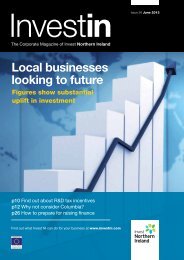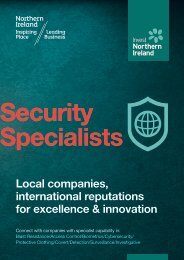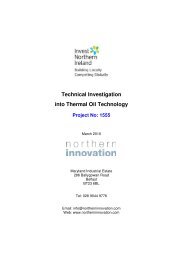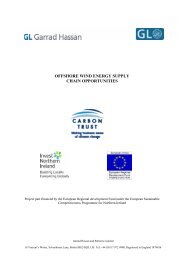Invest NI No Nonsense Guide 11 (PDF) - Invest Northern Ireland
Invest NI No Nonsense Guide 11 (PDF) - Invest Northern Ireland
Invest NI No Nonsense Guide 11 (PDF) - Invest Northern Ireland
You also want an ePaper? Increase the reach of your titles
YUMPU automatically turns print PDFs into web optimized ePapers that Google loves.
You also need business adviceThis guide covers regulations.You should also read a guide togeneral business advice — frommarket research to writing abusiness plan12year (Class 2 contributions), plusNational Insurance contributionsbased on your profits (Class 4contributions). Contributionsare due at the same times as taxpayments.Self-employed peoplepay less National Insurancethan employees but receivesignificantly fewer benefits. Youmay want to take advice fromyour accountant.Next steps● See The tax return forindividuals, page 16● See Calculating businessexpenses, opposite● See Allowances for equipmentand premises, page 15● Visit www.nibusinessinfo.co.uk/taxes● If you are self-employedyou must register with HMRevenue & Customs. Contactthe Newly Self-EmployedHelpline:0845 915 4515. Or useForm CWF1 from the SelfAssessment Orderline: contact0845 900 0404● HM Revenue & Customs offersa guide for people startingup in business: Thinking OfWorking For Yourself? (SE1).Contact the HM Revenue &Customs Newly Self-EmployedHelpline: 0845 915 4515;www.hmrc.gov.uk/startingupTax for alimited companyIf you set up a limitedcompany and work for it, thecompany will pay corporationtax on its business profitsand you will be taxed as anemployee of the companyYou will pay income tax andemployee’s Class 1 NationalInsurance contributions on youremployment income from thecompany. This is called PAYE— Pay As You Earn. Income taxis deducted from all earningsabove your personal incometax allowance. Your allowancedepends on your circumstances.Your business also has topay employer’s Class 1 NationalInsurance contributions for youand any other employees.Your company’s profits eachyear are liable to corporation tax:the company’s taxable profit isits sales income less its businessexpenses (see Calculatingbusiness expenses, opposite) andany investment allowances (seeAllowances for equipment andpremises, page 15).Companies have to calculatetheir own corporation taxliability. There are also specificrules on what can count asa business expense whencalculating the profits.You will also be taxed on anyreturn on your investment in thecompany or any dividends andbenefits you receive from thecompany, as well as on any loansthe company may make to you.Next steps● See Calculating businessexpenses, opposite● See Allowances for equipmentNational Insurance contributions (2012–13 tax year)Class <strong>11</strong>2% of weekly earnings between £146 andcontributions £817 and 2% on earnings above £817*Employer’scontributionIncome tax (2012-13 tax year)13.8% of employee’s weekly earnings above£144 a week**Lower rates apply if you belong to a contracted-outoccupational pension schemeBasic personal allowance £8,105**The allowance reduces for incomes above £100,000Tax rates on income above personal allowanceBasic rate £0–£34,370 20%Higher rate £34,371–£150,000 40%Additional rate More than £150,000 50%The <strong>No</strong>-<strong>No</strong>nsense <strong>Guide</strong>








